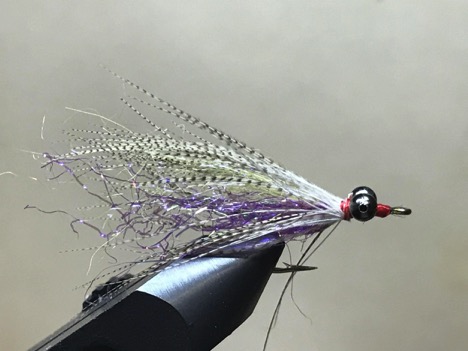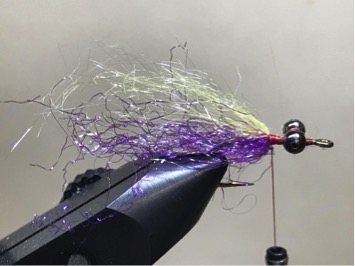This weeks submission comes from C.H.Beaumont. The Baggenstoss Streamer is a fly with an interesting name and a great story behind it.
The Baggenstoss - By C.H. Beaumont
The Baggenstoss Streamer.
During the duck season of 2018, two separate hunters handed me bags full of duck feathers. While about the same time Bart, featured the Hornberg Special fly pattern on his Panfish On The Fly website. I was very intrigued by the colors that came through the flank feather of the Hornberg and asked myself, how I could use this to imitate a juvenile red ear sunfish, one of the primary forages in my local lake?
A bluegill fooled by the Baggenstoss!
I played around with the pattern using purple and yellow dubbing under the duck flank. Then I wanted it the fly to ride hook up since I was casting to cover most of the time. I also found hard-hitting bream and bass would damage the flank feathers. So, I added bead chain eyes and tried palmering the duck flank. It worked!!
Crappie like to hold tight to cover, the up-riding hook of the Baggenstoss make it a great choice for fishing around brush piles, grass and rock.
I have found bead chain eyes or micro barbells seem to work the best for weight. I don’t do well with heavier weighted Baggenstoss patterns. I fish them around brush piles, rocks, grass and other cover that hold crappie, bluegill, and bass. Long pauses in the strip, letting the fly fall slowly seem to be most effective. This fly has become my go-to pattern during the late winter to early summer. I have experimented with other colors and so far have had the most success with a black body under the duck flank.
The Baggenstoss is also a great pattern for larger predators like largemouth bass
The name The Baggenstoss is in honor of my Great Uncle Herman Baggenstoss. Uncle Herman taught me how to fly fish. He worked for the National Park’s Service in the 1920s. During the Depression, he worked for the Civilian Conservation Corps and helped develop the South Cumberland State Park in Tennessee.
Tying the Baggenstoss:
Materials:
Hook: Size 8 Mustad 3366
Thread: 6/0 red thread
Upper Wing: Light yellow UV Ice Dub
Lower Wing: UV purple Ice Dub
Hackle: Lemon wood duck or mallard flank feathers
Eyes: Bead chain
Tying Instructions:
Step 1: Start the thread and tie in the bead chain about 1-1.5 eye lengths behind the eye.
Step 2: Tie in the wing midway between the point of the hook and eye. Yellow on top and purple on the bottom (it will ride hook up).
Step 3: Select a flank feather, pull the fluff and barbs off to the thinner part of the quill. Tie in the flank feather tip first, just ahead of the wing.
Step 4: Fold the feathers together and palmer forward.
Step 5: Whip finish and apply Solarez Bone Dry to thread. Cure with UV light.









